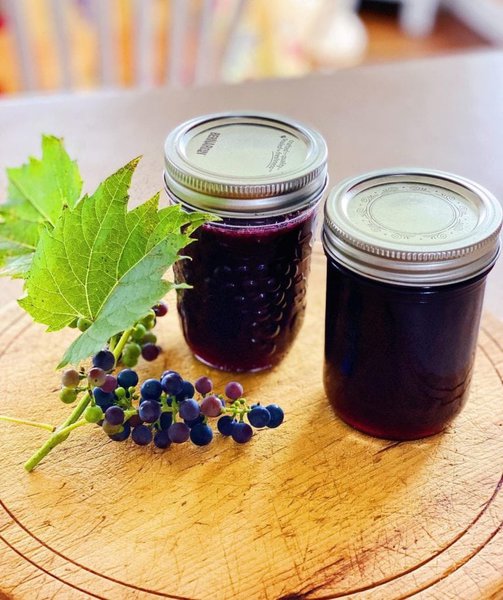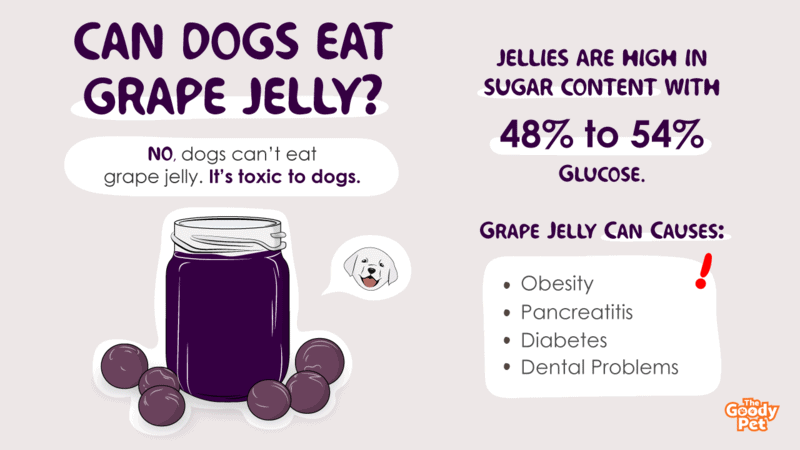Grapes have been cultivated by humans for thousands of years for their wine and the fruit has many health benefits that provide essential vitamins and minerals. Thus, products made from grapes abound in the market like raisins, dried currants, juices, jams, and jellies. But is it safe to give to our pet pooches?
No, it is not safe to give grape jelly to dogs. Grape jelly products contain grapes and other components that are highly toxic to dogs. No matter how delicious grape jellies are for us humans, they should never be fed to our pooches.
In this article, we will discuss why grape jellies are considered harmful and toxic plus the symptoms to look out for in case your dog ingested some of this product. We will also discuss if other kinds of jams or jellies made from other fruits can be considered toxic to your pet.
Is It Safe For Dogs To Eat Jelly?
No, it is not safe for dogs to eat jelly. This is because jellies are high in sugar content with 48% to 54% glucose. Excessive sugar consumption for dogs can lead to inflammation throughout the body and cause diabetes along with other health problems.
Even low-fat jellies are not recommended for feeding pooches, because they contain sugar substitutes like xylitol that can cause liver damage, hypoglycemia, seizures, and death.
What are the consequences if your dog has eaten jelly? What is grape toxicity all about? We’ll give you the answers to these questions but first, apart from sugar, what’s in a jelly that makes it bad for your pooch?
Citric Acid
Jellies contain citric acid that causes stomach upsets, vomiting, diarrhea. Too much consumption of citric acid may also develop central nervous depression.
Pectin
Pectin is also one of the main ingredients of jelly which is responsible for keeping it firm, thick, and spreadable. Although pectin is used as a diarrhea treatment for dogs, large amounts of this will result in constipation.
On the other hand, pectin in large quantities can cause tummy problems, difficulty in breathing, and fluid build-up in the chest.
So, avoid feeding your dog jelly even if it contains fruits that are harmless to your dogs like strawberries, blueberries, and raspberries. The main ingredients of this confection are harmful to your dogs when consumed.

What Happens If Your Dog Eats Jelly?
While a tiny amount may not be fatal to your dog, regularly feeding your pooch with jelly is detrimental to its health. Some of the issues your pooch might develop are the following:
Obesity
This is the biggest health threat for dogs. All sorts of health problems are associated with obesity like arthritis, high blood pressure, kidney and liver disease, diabetes, and heart failure.
Pancreatitis
The pancreas can overproduce certain digestive enzymes to metabolize glucose. This in turn will lead to the inflammation of the organ making it very painful to your dogs.
Diabetes
Being overweight increases the chance of getting diabetes since it makes the cells more resistant to insulin. The more resistant it is, the less glucose is converted into energy, thus, blood sugar levels will rise.
Diabetes may also cause the loss of appetite, chronic and recurring infections, and eventual weight loss in dogs.
Dental Problems
Bacteria love sugars and large consumption of these can speed up the development of cavities, gum problems, and teeth loss.
Grape Toxicity In Dogs Explained
Grape is one of the most poisonous fruits that can cause harm to their kidneys and induce diarrhea and vomiting, even leading to death if consumed in large amounts.
Grape toxicity or poisoning is a serious matter that must be dealt with immediately. One or two pieces of grapes can risk the health of a 10-pound dog.
Ingestion of grapes, raisins, and currants causes kidney failure in dogs. The toxin responsible and its mechanism to your pet’s body is still unknown but its effect is evident on the proximal renal tubular epithelium of the kidneys.
Diarrhea and vomiting can occur within 6 to 12 hours of ingestion and lethargy, stomach pains, dehydration, and shivering follow. Failure to seek medical help will lead to fatal kidney dysfunction within 1 to 3 days.
Grape jelly contains grape juice and ingesting even small amounts of this product is a major health risk, so avoid letting open jars of grape jelly lying in the kitchen or dining area.
What Do I Do If My Dog Eats Grape Jelly?
There are three things you should do when your dog happens to eat grape jelly.
- The first thing to do is to learn how much grape jelly your dog has consumed and when it happened. It usually takes 6 to 12 hours for the grapes to do their damage.
- The second thing is to look for early signs that your dog may be suffering from grape toxicity such as diarrhea, vomiting, lethargy, and appetite loss.
- Lastly, take your pet immediately to the veterinarian for medical intervention.
Here are the emergency procedures that a vet will do to your dog to address ingestion of grape jelly:
Gastrointestinal Tract Decontamination
Once you have taken your dog to the veterinarian, the immediate recommended treatment is by inducing vomiting with the administering the right dose of 3% hydrogen peroxide, dependent on the dog’s weight, and then followed by activated charcoal. This helps in preventing the toxins from being absorbed from the stomach into the body.
Forced Diuresis
When diarrhea and vomiting have spontaneously developed within the last 12 hours, especially if the dog has ingested large amounts of grapes or grape jelly, forced diuresis via intravenous fluids is done at a minimum of 48 hours. This will force the dog to pee and get rid of the toxic substances.
Close Monitoring Of Renal Functions
Regular monitoring of fluid balance is done. If the dog is oliguric, meaning it pees an abnormally small amount, stimulation of urine production is done by giving dopamine or furosemide.
For dogs that stopped producing urine entirely, survival is very unlikely unless peritoneal dialysis or hemodialysis is conducted. In most instances, euthanasia will be the recommendation.
Can Dogs Have Sugar-Free Jelly?
No, sugar-free jelly usually has artificial sweeteners like xylitol that is poisonous to your pooch, so keep it away from your dog at all costs.
Xylitol poisoning will cause vomiting, a sudden decrease in blood sugar levels, weakness, sudden loss of coordination, and seizures. It is also found in sugar-free candies, sugar-free peanut butter, toothpaste, and chewing gums.
Therefore, it is always best to check the labels of the food products to better protect your dog. If you think your dog accidentally consumed any products with xylitol, it is best to take it to the veterinarian immediately.
Serious adverse effects like hypoglycemia can take up to 12 to 24 hours of medical monitoring.
What about strawberry jelly, peanut butter and jelly, and Welch’s grape jelly, are these also off-limits to your pooch?
Is Strawberry Jelly Bad For Dogs?
Mostly made of sugar, strawberry jelly is indeed bad for dogs to consume. While strawberries in themselves can be given as a treat from time to time and are safe for dogs, strawberry jelly is not recommended. The nutritional value of jelly is mostly glucose from the simple sugars and fructose from the fruits.
Other jellies like raspberry jelly and cranberry jelly are also not recommended. Raspberries and cranberries are safe to be consumed moderately but adding sugar to them is a big no-no.
Can Dogs Eat Peanut Butter And Jelly?
No, dogs cannot eat PB&J due to the high sugar content. Although peanut butter can be safe for your dogs in small amounts, like giving it as an occasional treat, it is still not safe when given regularly especially if it is partnered with jelly.
In addition, if you add bread which is mostly carbohydrates, then that is just piling them with too much sugar that ruins their diet. To be completely safe, treat your dogs with plain peanut butter that is specially made for dogs.
Is Welch’s Grape Jelly Safe For Dogs?
Welch’s grape jelly, which is similar to Smucker’s grape jelly, is not safe for dogs. The ingredients of both products are almost similar and they both contain Concord and Niagara grapes, standard corn syrup, high fructose corn syrup, fruit pectin, sodium citrate, and citric acid.
As discussed above, all grapes are toxic to animals, so this brand is no exception. The number of sugars in this product is significantly high, making it an overall unhealthy product for your dogs to consume. Although both the standard and high fructose corn syrups are derived from corn starch, both are high in glucose and fructose contents, respectively.
The three other ingredients, namely, pectin, citric acid, and sodium citrate are not toxic to dogs but can cause stomach upsets, diarrhea, or constipation.





